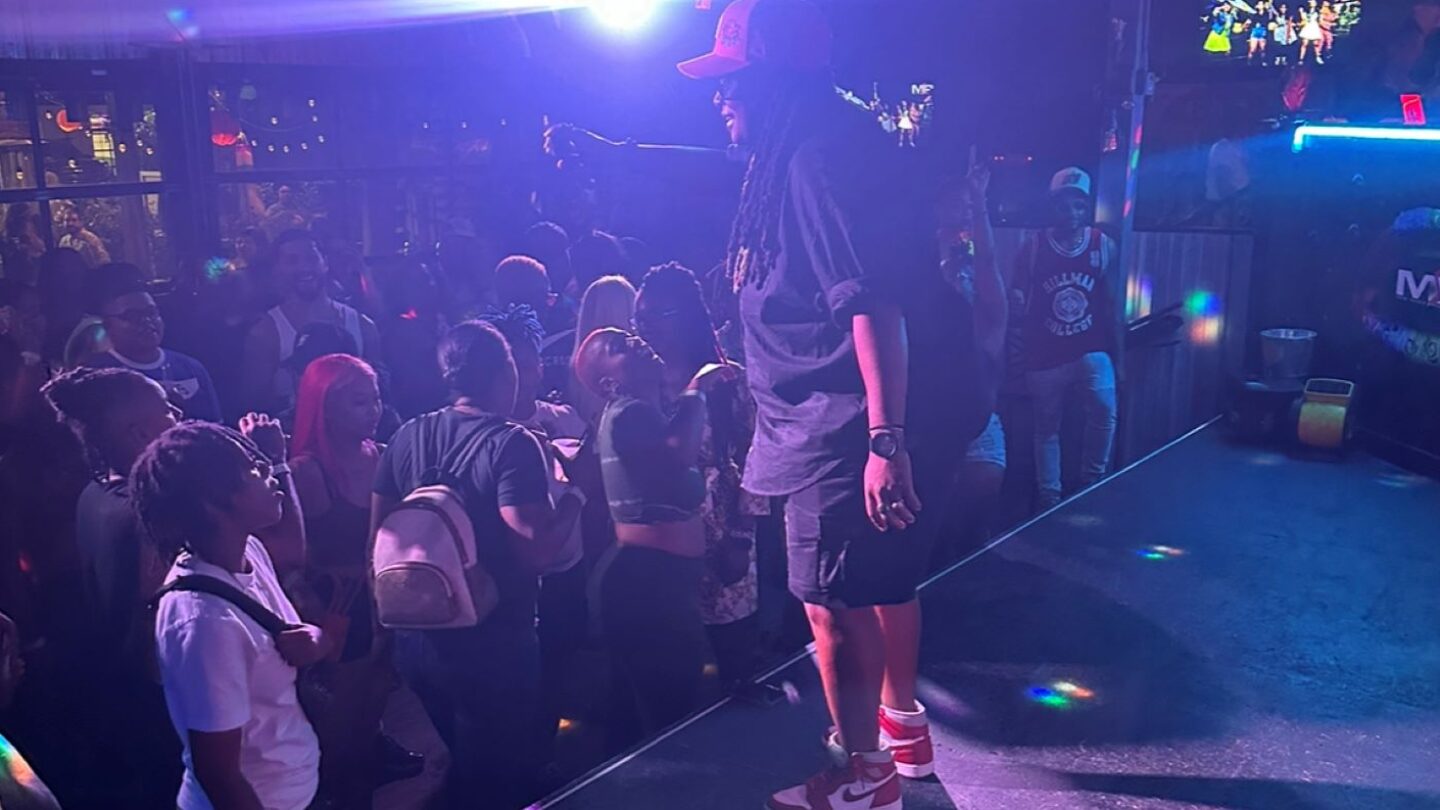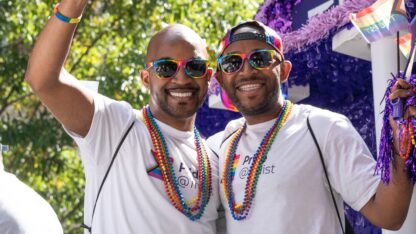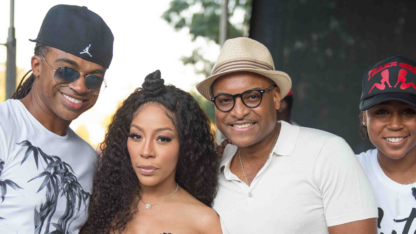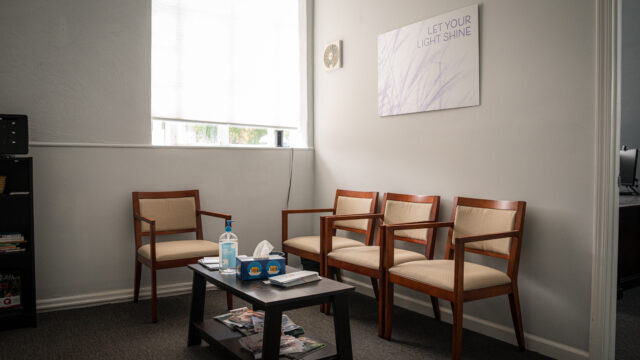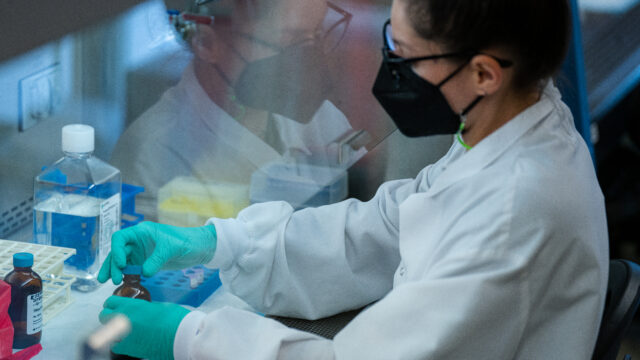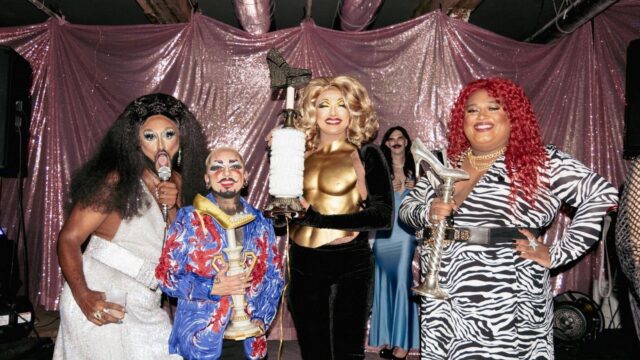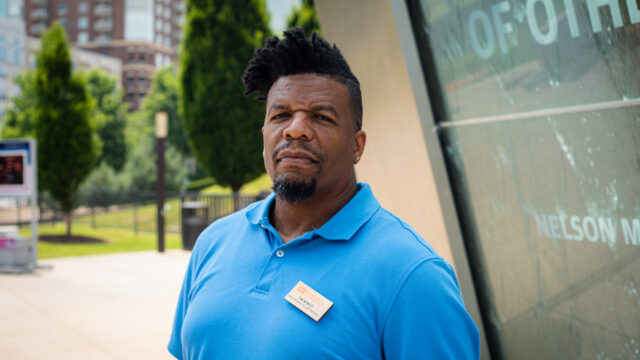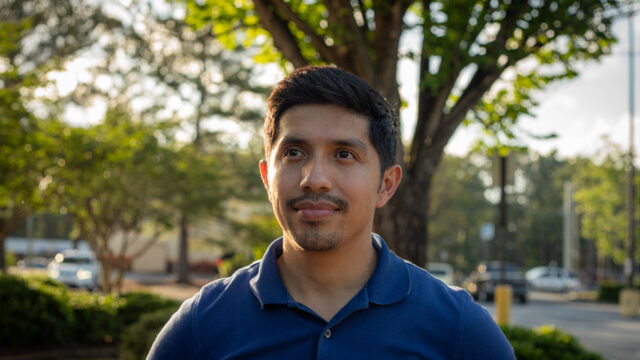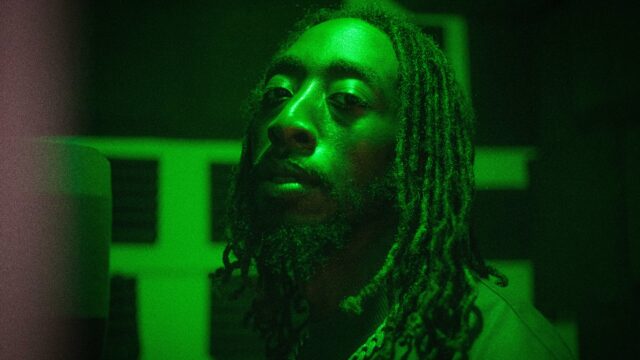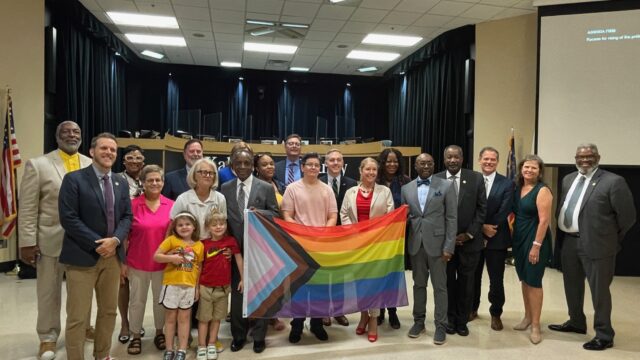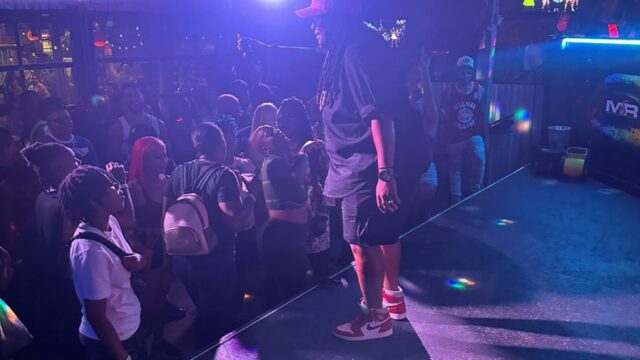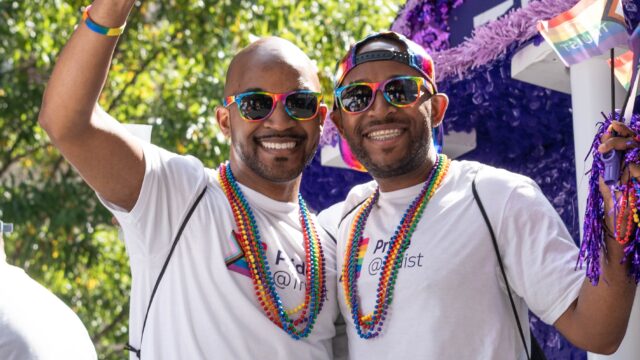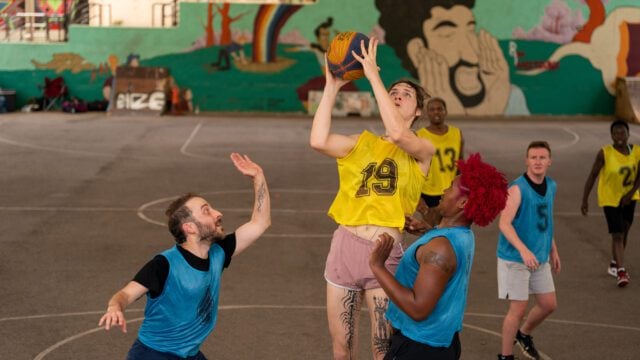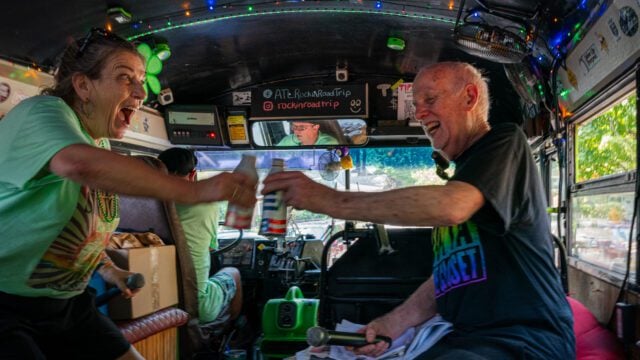When Ian Aber enrolled in his first stand-up comedy course in 2011, he discovered quickly how much he enjoyed the craft of joke writing and audience interaction … as well as just how difficult it would be to break into an industry that did not have many comics like him in the limelight.
“During our graduation show, this huge showcase at the end of the course where all of our family and friends come out, I showed up to the class to talk to [the instructor] about it, he was like, ‘Well you know if you wanna work in Atlanta … you can’t be gay. [If] you want to work regularly and all of that, the gay stuff’s not going to work.’”
The then-freshman comic watched as the instructor quickly reworked Aber’s jokes to change his husband to his wife and cut out material that a primarily straight audience might have been uncomfortable with.
Aber stuck to his initial set of jokes and got a positive reception from the crowd. He was initially offended by his instructor’s persistence to hide his orientation, but he understood that there was truth behind the instructor’s logic.
“The point that he was making was that there weren’t a lot of gay comedians doing comedy in Atlanta, and he wasn’t wrong about that,” Aber said.
Aber, a prominent creative force at Atlanta comedy club Laughing Skull Lounge and one of the city’s most well-known queer comics, is one of a handful of pioneers of the growing LGBTQ comedy scene that the city has experienced in recent years. Alongside comedian Kia Barnes and comic/ drag performer Brent Star, the three comics have spent years in a field where the term “queer comic” was once thought of as a punchline instead of a headliner.
“In the beginning, it was very few of us,” said Star, an Atlanta drag staple who hosts a biweekly drag bingo at Urban Pie in Kirkwood. “There were times as a gay comic, you would get silence from a crowd that was hardcore straight, or wanted to see a straight comic, and you get that awkward feeling of ‘maybe I don’t belong in this room.’ But it’s gotten better.”
With the rise in representation has come a rise in queer-friendly spaces where entertainers across the city have been able to develop their material and following.
Barnes, who hosts a weekly Friday comedy night at popular lesbian bar My Sister’s Room in Midtown, says it is imperative for her to use her platform to help uplift queer performers.
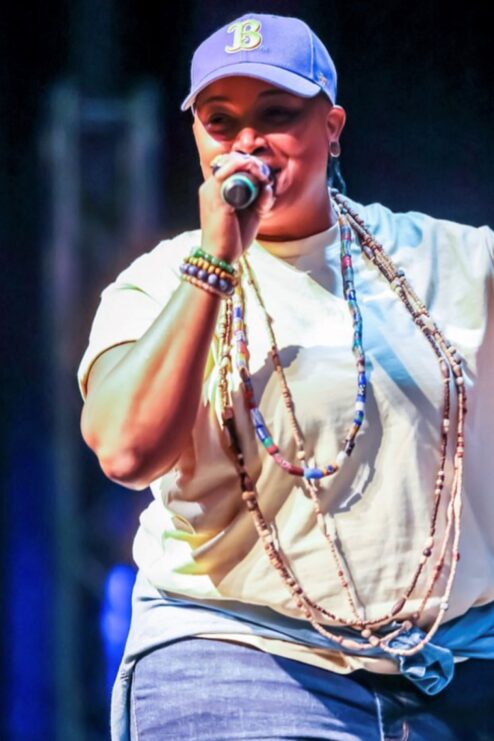
“I am very intentional about working within queer communities. As I’ve built [comedy] tours, I don’t seek out the biggest venues or comedy clubs. I reach out to queer comedians within the community,” she said. “Not just for the comedy shows, but also with my music shows, for my fashion shows. I highlight queer spaces and queer faces.”
P.J. Audenzia is a comedian who made her debut in Atlanta’s comedy scene in 2019. Audenzia, who is transgender, said sets can go smoother performing in queer spaces or for queer audiences.
“On an LGBTQ-specific and focused mic … I feel that there is less catch-up that I have to do to get them to go on this journey with me,” she said. “I feel that there is a much higher chance that I’m going to be seen, heard and understood.”
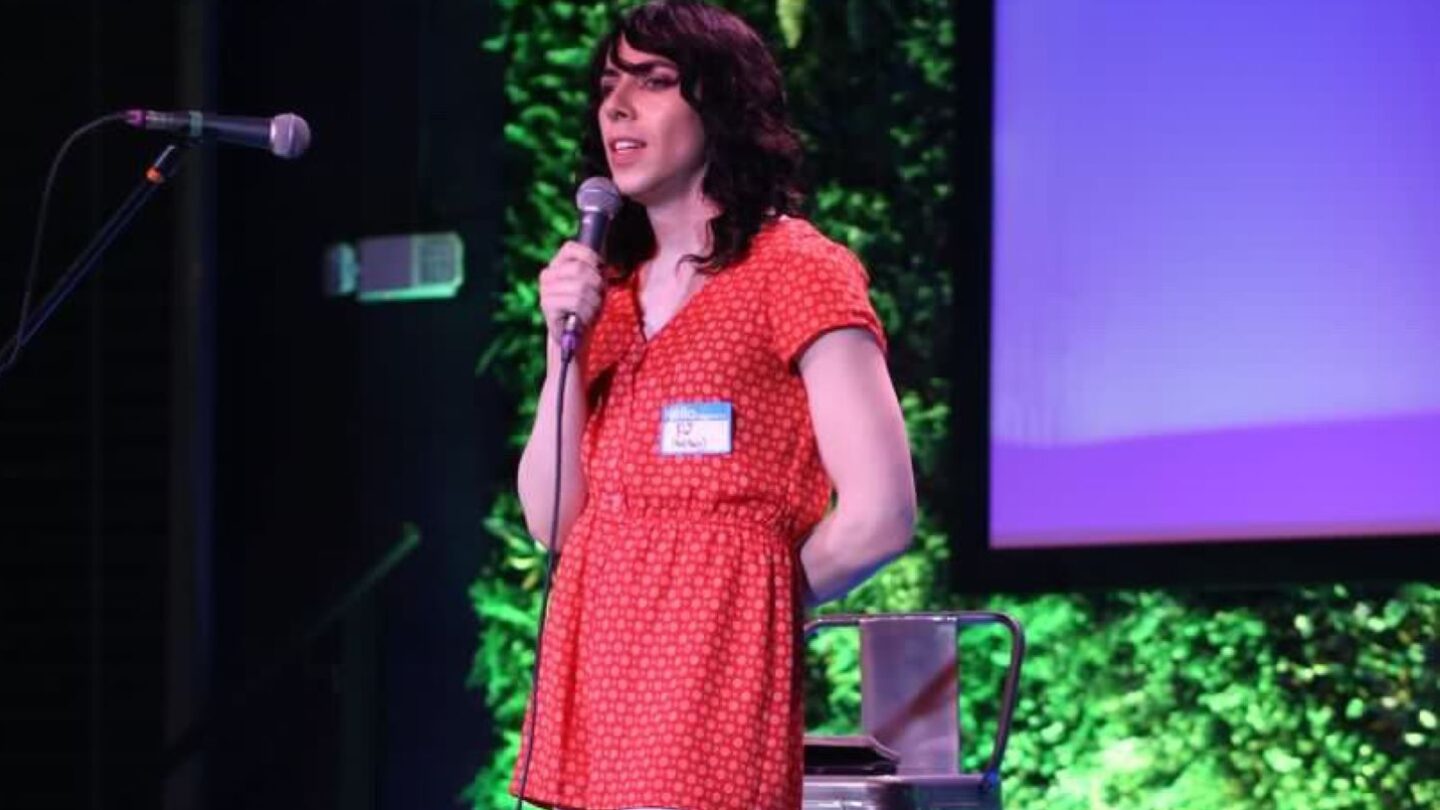
One of the biggest gifts that Audenzia says Atlanta’s LGBTQ comedy scene has given her is learning how to bring an audience along on her journey transitioning, and all of the changes that experience has brought to her life.
“There are a lot of jokes to write about this experience and a whole new angle shift on the world that I’ve got,” she said. “And I’ve found that there are audiences of bemused straight people and cis people who want to go along for the ride … white cis- homeowners, ‘normies’ that we would call them.”
And while most straight audiences might not always understand the first-hand experiences of the LGBTQ community, Star notes that a majority have become more comfortable throughout the years in letting their guards down.
“There have been internationally touring headlining comedians who have come in the green room and just came at me. ‘How could you, why would you, how dare you?'”
Kia Barnes, Comedian/ Host
“The audience is becoming more acceptable because there are so many of us they have no choice,” said Star. “I think it’s very important for the audiences to realize, ‘yeah we’re gay,’ but listen to our jokes. ‘Yeah I’m gay’ but I’m a comedian. I am beyond what I do sexually. I am beyond the makeup. I am a person just like you, and I think audiences are getting that.”
“The opposite extreme [of not being accepted by audiences] is ‘clap-ter,'” said Audenzia. “That they are giving you performative applause because they think that you are brave in that you are trans and you have a punchline. I think that what you hope for is that your material comes into a personality of its own that emerges and is remembered just as much as the fact that you are ‘Penis Girl.'”
While there is a rise in acceptance from local clubgoers, there is still a national conversation occurring around whether certain jokes being told to audiences — especially jokes geared towards the LGBTQ community — do more to promote bigotry against queer people rather than inclusivity.
In recent years, famous comedians such as Dave Chappelle and Ricky Gervais have come under fire for jokes featured in their respective Netflix specials that have been labeled by many as transphobic and homophobic.
Although Star has not watched the specials of either comedian, he believes that the approach to performing sensitive subject matter has to come with the intention of making an audience laugh rather than making a political statement.
“Have you ever seen tragedy happen and then you go on social media, and someone already has a very clever meme … and you’re like ‘this is horrible, but this is funny,’” he said. “I think if you want to say how you feel about a certain group of people or a certain subject, OK. But make sure that it’s funny, make sure it is done in a way where you are not making a group of people the butt of the joke.”
“On an LGBTQ specified and focused mic … I feel that there is a much higher chance that I’m going to be seen, heard and understood.”
P.J. Audenzia, Comedian
“I don’t appreciate and I find the stuff [Chapelle] said about trans people to be more offensive and on the lines of ‘please don’t say that,’ because of the disproportionately more things that trans people have to deal with as a cis-gendered gay man,” Aber said. “I’m not gonna listen to those trans jokes and be like ‘it’s the same thing when he makes fun of gay people’ and it’s not. The transphobic rhetoric is the highest I’ve ever seen it … on both sides.”
Barnes notes that in her own experience starting out, while she saw insensitive jokes told by comedians onstage, most problematic behaviors she experienced occurred while getting ready for the show.
“There have been internationally touring headlining comedians who have come in the green room and just came at me. ‘How could you, why would you, how dare you?'” she said.
Aber had a similar experience when building his career in the early 2010s, with the behavior being enough to make a colleague quit the art form.
“I had an experience where a gay guy was super funny, he came around trying to do stand-up, and the straight comics at the time were calling each other F slurs and laughing … he found the culture of the comedy so inherently homophobic that he didn’t want to participate,” said Aber.
“I was way more offended with how they behaved offstage than anything that I had heard onstage, which sounds crazy,” he added.
Despite the fight to continue to be seen and respected by peers and audiences, as well as some of the overall tribulations involved in the fast-paced and uncertain world of comedy, all of comedians agree that they could not imagine doing anything else in the world.
“I feel like a superhero,” said Star. ” It might sound corny … but I’m saving people from darkness, from being depressed, from being mad about something, from being angry and bring them laughter. It’s like they are all Sims and this is my world and they are a part of it.”
And according to Barnes, those in the city’s comedy scene who originally doubted whether or not queer comedians could navigate a successful career are now the same ones asking her for career advice.
“[They] want in now, but you told me it wasn’t going to work for me, but now you see me on billboards in Times Square, and you want to know ‘how did you do it?’… really gayly … very gay … super gay!”
This story is part of the ongoing series Beyond Pride, in which WABE reporters take a deeper look at the issues affecting LGBTQ people in Georgia. Plus, hear LGBTQ Atlantans in their own words, check out a Pride events calendar running through the fall, LGBTQ coverage from other NPR stations across the South and more.
